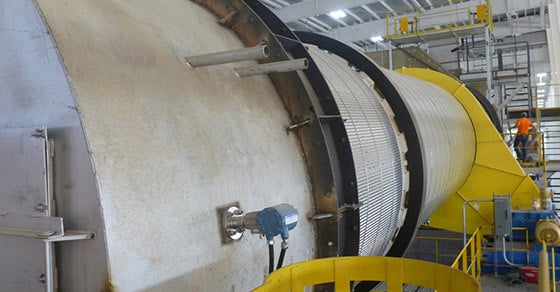Rotary kilns have become an integral processing device throughout many industries. Capable of facilitating chemical reactions and phase changes, they are applied to a diverse range of applications, from metal recovery, to specialty chemical production, and carbon activation, to name a few. In fact, the applications in which rotary kilns are employed continue to grow as the world moves toward a more sustainable society.
Engineered around thermal and chemical analyses of the material being processed, in combination with advanced thermal processing theory, rotary kilns are complex systems in both design and operation.
This can present a challenge when process conditions change or a production issue arises. As such, FEECO process audits are a valuable tool in resolving production problems, optimizing an existing process, and adjusting a system to meet changing parameters.
When is a Rotary Kiln Process Audit Necessary?
There are several settings in which a process audit may either be necessary, or will provide significant advantage:
Production Conditions Have Changed
As rotary kilns are designed around the characteristics of the feedstock and the unique process goals, changes in feedstock, production capacity, or process parameters can significantly reduce kiln performance and efficiency.
Whenever production conditions change, a process audit should be conducted to optimize the process around the new parameters.
The Process is not Performing as Designed
For various reasons, a process may fall out of spec. This may be exhibited by a number of indications, including:
- An increase in off-spec product
- A reduction in on-line availability
- An increase in fuel or utility consumption
- Unexplained downstream maintenance issues
- A decrease in capacity
- A sudden or gradual inability to meet emissions requirements
Outfitting an Old Plant for a New Purpose
Purchasing an existing plant can be a cost-effective alternative to building new, but it presents its own set of challenges. Existing kilns that will be utilized in a new way may require a significant amount of re-engineering and upgrading in order to properly meet the intended functionality.
Similarly, plants that have been mothballed for any period of time will typically require repair and adjustments to bring the kiln back online.
The Audit Process
Unlike an equipment inspection, which principally centers around the mechanical aspects of the kiln, a process audit considers how the unit interacts with the rest of the process, in addition to its mechanical performance. Each aspect of the process must be evaluated, as even a subtle change in one area can have an impact on another area.
FEECO kiln process audits are a thorough evaluation of the rotary kiln itself and the system and process conditions surrounding the unit. Audits typically begin with the Process Engineer comparing original operational design parameters with existing operating conditions, paying particular attention to the heat and mass balance.
The data points commonly examined around a rotary kiln include:
- Inlet and outlet temperatures of material
- Fuel consumption
- Feedstock characteristics
- Desired product specifications
- Downstream process equipment design and performance
- Kiln pressure
- Drum internal configurations
- Exhaust gas temperature, flow rate, and composition
Of course, the mechanical condition of the kiln will also be evaluated to ensure it is in proper working order for the job at hand.
The Process Engineer will then analyze all of the information, in combination with the audit objective, to assess potential changes to the process or rotary kiln. The identification, diagnosis, and resolution of kiln issues is a highly complex task.
In a detailed report, the Process Engineer will recommend various changes depending on the issue. This might include:
- Changes to the process conditions
- Mechanical modifications to the equipment
- Feed capacity adjustments
- Burner adjustments/changes
- Control system changes
- And more…
Recommendations are outlined with costs and ordered based on level of priority.
Benefits of Conducting a Kiln Process Audit
Whatever the reason for the audit, implementing the recommendations often results in a number of benefits:
- Improved product quality
- Reduced fuel and/or energy costs
- Increased production
- Reduced equipment wear
- Minimized downtime
- Lower maintenance costs
As a result, rotary kiln process audits can yield significant savings.
Selecting a Kiln Process Audit Provider
In selecting a provider, the following should be considered:
Experience
With innumerable applications and configurations, no two rotary kiln systems are alike. As such, a process audit should only be conducted by a provider that is well versed in thermal processing theory, industrial process optimization, and materials science. Look for a provider that has a well-rounded background, or special skills in the industry at hand.
Full-Service Provision
One challenge often encountered when conducting a rotary kiln process audit is that it requires orchestrating several vendors to work together: one to conduct the audit, one to provide the necessary engineering, and finally, one to carry out the changes required. This can leave room for error and miscommunication, and ultimately, sub-par results.
Finding a provider that can accomplish multiple, if not all, tasks will provide the best result and streamline the audit process along the way.
Conclusion
Rotary kiln process audits are an essential tool in optimizing process performance, preventing unnecessary downtime and maintenance, and even avoiding premature equipment failure. They are also an excellent way to optimize an existing process for maximum efficiency or in preparation of changes in production, with many beneficial outcomes possible.
FEECO is a global leader in advanced thermal processing, with expertise in engineering, manufacturing, and servicing custom rotary kilns. Our Process Engineers regularly conduct rotary kiln process audits, assisting in post-audit engineering, and making any adjustments or retrofits needed. We also have a unique testing facility that can be used to gather process data and confirm proof of process when evaluating production changes.
For more information on our rotary kiln process audits, contact us today!



